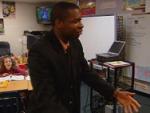In a cheerful, colorfully decorated classroom at Alexander Elementary School in a poor, gloomy neighborhood of Greenville, S.C., Damon Qualls is surrounded by eager fifth graders. As he reads from a biography of Eleanor Roosevelt, the 15 fifth graders give him their complete attention, a measure of respect for Qualls in only his third year as a teacher.

Zeb Dinkins taught
his students about
World War II
by rapping about it.
(ABCNEWS.com)Qualls, 24, is a rare sight at Alexander — and every other school in South Carolina — the only male among the 32 teachers assigned there. “Male students want to have someone in the classroom they can identify with,” says Qualls. “And you can go even further and say African-American students need someone to identify with.”
That is clear at recess. Even on a chilly winter day, students from several of Alexander’s grades enthusiastically follow Qualls to the playground where he directs a game of baseball. He is one of a handful of African-American men to teach in the Greenville County school district, where blacks account for more than one quarter of the students.
Nationally, there is a huge gender gap dividing the ranks of public school teachers, according to 2005 figures from the National Education Association. Of the 3.7 million teachers today in the United States, just 25 percent are men, a number that has stagnated for years despite efforts to increase that percentage. In some individual states, the gap is greater.
In South Carolina, 18 percent of public school teachers are men. And of that group, only 1 percent is African-American. “They are a precious commodity,” says Phinnize Fisher, superintendent of Greenville County Schools, which has 67,000 students. Greenville recruits men nationwide, facing stiff competition and confronting lack of interest in a starting teacher’s salary of $30,308 a year. “There are so many exciting opportunities and careers that they can go into instead of teaching,” says Fisher, “at much higher salaries.”
But just as Qualls provides hope for his students, he also provides hope for his school district and others in South Carolina. He is a graduate of an aggressive program, “Call Me Mister,” which recruits African-American male students entering college to become teachers.
See the “Call Me Mister” Website
At Clemson University, 15 young black men sit around a conference table, all neatly dressed in “Call Me Mister” signature colors of orange and brown, for a discussion of their progress toward becoming teachers. About one-third of their college costs are being paid by South Carolina, and the students have agreed to teach in the state for four years after graduation.
But it is apparent that reducing the cost of a college education is only part of the reason they chose to become teachers. Tony Webb, 26, is the first in his family to attend college, and after flunking 7th and 8th grades, he didn’t have much hope of ever seeing a place like Clemson. He will graduate next year. “I want to be a teacher because I had a horrible experience with the public school system,” says Webb. “There really isn’t a positive image of African-American males,” he adds, “other than being athletes and entertainers.” Abdurrab Watkins, a sophomore, 20, says enthusiastically, “The potential involved in this program is tremendous.”
Standing outside Tillman Hall, which black students first entered in 1963 after a long integration struggle, Watkins adds, “The opportunity it provides you, to impact the future as far as children are concerned, is wonderful.” Daniel Spencer, 21, a junior, says that by teaching he will show, “With an education you can do anything; and for children who want to get out of poverty, they can get an education and do that.”
At Clemson and on nine other campuses, there are 150 people now in “Call Me Mister” who, when they graduate, will double the number of African-American male teachers in the state. But earlier recruits to the program are already transforming classrooms — like Zeb Dinkins, 24, in his second year of teaching social studies to fifth graders at Welcome Elementary School in Greenville.
On this morning, dressed in jacket and tie, Dinkins is giving an overview to his 20 students of the scope of World War II. There are no books open in front of the bright, engaged faces. Instead, Dinkins leads the class in a rap song he has written. The students sing along, every one. Dinkins has clearly reached his students and helped them, with rap, embrace the subject.
And later, they easily answer every quiz question about the war correctly. Dinkins hasn’t thought about his salary this morning, or how much more the workers at Greenville’s new BMW and Michelin corporation factories are making. “When I see their eyes,” Dinkins says, “I see they learned something new. Or if I have a child tell me, ‘You did a great job today,’ it keeps me motivated.”
“Call Me Mister” organizers believe their program could become a model for the entire nation.See the Video
